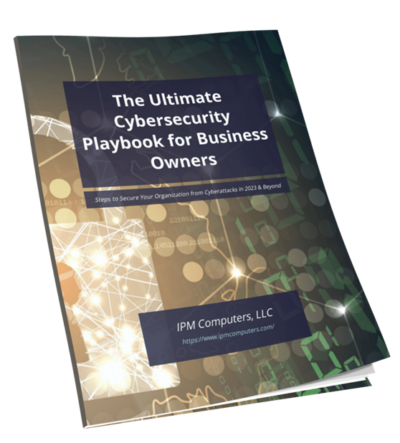The holiday season is fast approaching. The festive season brings joy and excitement, but it also opens the door to holiday scams. As you prepare for the holiday season in the age of growing Wilmington cybersecurity concerns, understanding these risks is crucial. Below, we’ll focus on:
- Common holiday scams that target unsuspecting shoppers
- The importance of cybersecurity during this busy shopping period
- Practical tips to protect yourself and your business from potential threats
At IPM Computers, we believe everyone deserves a happy and safe holiday season. Our latest blog article provides valuable insights for safeguarding your holiday prep against cybercriminals. Awareness and proactive measures can significantly reduce your vulnerability during the most wonderful time of the year.

Understanding Common Holiday Scams
The holiday season brings joy but also increases the risk of scams. Key types of scams include:
1. Phishing Scams
Cybercriminals send deceptive emails or messages that appear to be from legitimate retailers. These often contain links to fake websites designed to steal personal information. For example, an email claiming special holiday discounts may direct you to a fraudulent site.
2. Courier Text Scams
As shopping online surges, so do courier-related scams. You might receive texts that appear to be from delivery services, urging you to confirm a package shipment. Clicking on these links can lead to malware infections or data theft.
3. Fake Webpages
Scammers create look-alike websites mimicking popular retailers. Unsuspecting shoppers may input their payment information on these sites, resulting in financial loss.
Statistics reveal alarming trends during the holidays. The FBI reported a 30% increase in online scams during this period compared to other times of the year. This rise is due to heightened online shopping activity. Shoppers are often more vulnerable and less vigilant, making it easier for scammers to exploit them. Recognizing these common scams is essential for successful and safe holiday shopping.
Cybersecurity Risks Businesses Face During the Holidays
The holiday season presents unique cybersecurity challenges, particularly due to a surge in cybercrime pitfalls. Businesses often experience heightened threats, including:
1. Ransomware attacks
Attackers exploit increased online traffic and remote work environments, targeting vulnerable systems to encrypt data until a ransom is paid.
2. Malware attacks
Malicious software can infiltrate business networks, leading to data breaches or unauthorized access to sensitive information.
Several factors contribute to these elevated risks:
- Increased online traffic: The surge in holiday shopping creates opportunities for cybercriminals to launch attacks during peak times when businesses may be less vigilant.
- Remote work setups: Employees working from home may use unsecured networks, making it easier for attackers to gain entry into company systems.
Identifying specific organizational vulnerabilities is crucial. Common weaknesses include:
- Outdated software: Failing to regularly update applications and security protocols leaves systems exposed to known vulnerabilities.
- Inadequate network security: Lack of robust firewalls or intrusion detection systems can permit malicious activity within the network.
Recognizing these threats allows businesses to proactively implement strategies and safeguard their operations during the festive season.
Cybersecurity Holiday Tips for Businesses: Safeguarding Against Holiday Scams and Cyber Threats
1. Update and Secure All Devices
Keeping all business devices updated is crucial for maintaining cybersecurity, especially during the holiday season when threats increase. Outdated software is a common vulnerability exploited by cybercriminals. Regularly applying security patches helps close gaps that may be targeted.
Key Actions to Take:
- Install Security Updates: Ensure all operating systems and applications are updated immediately upon release of security patches.
- Utilize Firewalls: Implement firewalls on all devices to block unauthorized access attempts. This acts as a barrier against threats while monitoring incoming and outgoing traffic.
- Configure Automatic Updates: Set devices to automatically download and install updates whenever possible. This minimizes the risk of human error in missing critical updates.
The importance of these measures cannot be overstated. Cybersecurity training should include education on the significance of timely updates. Employees must understand how their actions contribute to the organization’s overall security posture.
Consider employing endpoint protection solutions that actively monitor for suspicious activity. This proactive approach can detect potential breaches before they escalate.
2. Enable Multi-Factor Authentication for Business Accounts
Implementing Multi-Factor Authentication (MFA) is a critical step in enhancing your business’s security. MFA requires users to verify their identity through multiple forms of authentication, such as:
- Something you know: A password or PIN.
- Something you have: A smartphone or hardware token.
- Something you are: Biometric verification like fingerprints.
This layered approach significantly reduces the likelihood of unauthorized access to accounts, especially during the holiday season when phishing attacks peak. Cybercriminals often target accounts with weak security, exploiting vulnerabilities from unprotected passwords.
Utilizing MFA can decrease phishing attack success rates by up to 99%, making it an essential part of your cybersecurity training and strategy. Encourage employees to adopt this practice across all business accounts.
3. Use Strong Passwords and Password Managers for Business Accounts
Creating strong passwords is crucial in protecting your business accounts from cyber threats. Consider these guidelines for crafting passwords that resist guessing attempts:
- Length: Aim for at least 12 characters.
- Complexity: Incorporate uppercase letters, lowercase letters, numbers, and special symbols.
- Uniqueness: Avoid using the same password across multiple accounts.
Utilizing password managers can significantly enhance your security. Tools like Dashlane and 1Password simplify password management by generating and securely storing complex passwords. This reduces the risk of weak passwords and ensures that you use unique credentials for each account.
4. Practice Online Shopping Safety as a Business Owner or Employee
The holiday season brings increased opportunities for online shopping, but it also attracts cybercriminals. Implementing safe online shopping practices can significantly reduce risks. Consider the following tips:
- Verify Secure Connections: Always check for websites that use HTTPS. The padlock icon in the address bar indicates a secure connection, essential for protecting sensitive data during transactions.
- Avoid Dubious Links or Emails: Be cautious of unexpected messages or links. Phishing attempts often disguise themselves as promotions or deals. Scrutinize sender addresses and avoid clicking on unknown links.
- Engage in Cybersecurity Training: Ensure all employees are educated about potential threats and the importance of vigilance while shopping online. Regular training reinforces awareness of scams and proper security protocols.
- Utilize Multi-Factor Authentication: Strengthening account security with MFA can block unauthorized access, providing an extra layer of protection during transactions.
5. Protect Your Business Network with Secure Wi-Fi Practices
A secure Wi-Fi network is essential for safeguarding your business against unauthorized access and cyber threats. Implementing the following practices can significantly enhance your network security:
- Change Default Passwords: Most routers come with default passwords that are widely known. Change these immediately to strong, unique passwords to prevent easy access by cybercriminals.
- Use Encryption Protocols: Employ WPA2 or WPA3 encryption protocols to secure wireless communications. These protocols provide robust protection against eavesdropping and unauthorized access.
- Disable WPS: Wi-Fi Protected Setup (WPS) can be a vulnerability; disabling it reduces the risk of unauthorized connections.
- Hide SSID: Making your network name invisible to casual users adds an extra layer of security, preventing unwanted access attempts.
- Regularly Update Router Firmware: Keeping router software updated ensures you have the latest security features and patches against vulnerabilities.
6. Implement Unified Firewall Management for Enhanced Network Security in Your Business
Unified firewall management systems play a critical role in safeguarding your business against cyber threats, particularly during the holiday season when risks are heightened. These systems provide several advantages:
Comprehensive Monitoring: They continuously track network traffic, identifying unusual patterns that may indicate potential security breaches.
Centralized Control: A unified system allows for streamlined management of multiple firewalls across various locations, simplifying security protocols and policy enforcement.
Rapid Response Capabilities: In case of a detected anomaly, these systems can execute immediate actions to block unauthorized access or mitigate attacks.
7. Maintain Privacy on Social Media Platforms as a Business Entity During The Holidays
Social media plays a significant role in business visibility during the holidays. However, it also exposes companies to cybersecurity risks. Oversharing business information can lead to:
- Social engineering attacks: Cybercriminals may use shared details to manipulate employees into revealing sensitive information.
- Identity theft attempts: Publicly available data can be exploited to impersonate your business or employees.
To safeguard against these threats, consider implementing cybersecurity training for your staff. Educate them on the importance of maintaining privacy and recognizing suspicious activities.
8. Safely Dispose Old Gadgets and Gift Packaging from Your Business Operation Before Recycling or Discarding Them
Ensuring data disposal safety is critical for maintaining cybersecurity. Businesses must adopt proper practices when discarding old gadgets and gift packaging. Sensitive information can easily leak if not handled correctly.
1. Data Wiping
Utilize software tools to securely erase data on devices before recycling or discarding them. This prevents unauthorized retrieval of sensitive information.
2. Physical Destruction
For highly confidential devices, physical destruction may be necessary. Shredding hard drives or dismantling devices ensures data cannot be recovered.
3. Packaging Disposal
Gift packaging can also harbor sensitive details, such as invoices or receipts. Dispose of these securely to prevent identity theft.
Incorporating these practices into your cybersecurity training emphasizes the importance of safeguarding data integrity. By keeping software updated and using password management tools, businesses strengthen their defenses against potential threats.
9. Keep Your Team Informed About Potential Cyber Threats They Might Encounter During the Holidays
Keeping your team educated about cyber threats is essential during the holiday season. Regular cybersecurity training fosters a proactive culture within your organization. Consider implementing the following strategies:
- Recognize Common Threats: Train employees to identify phishing emails disguised as promotions or holiday offers.
- Reporting Mechanisms: Establish clear guidelines for reporting suspicious activities without hesitation.
- Emphasize Best Practices: Encourage the use of multi-factor authentication and strong password management techniques.
- Software Updates: Highlight the importance of keeping software updated to eliminate vulnerabilities.
Protecting Your Business from Holiday Scams & Cyber Threats
The holiday season brings an increase in online shopping and gift-giving, creating opportunities for scammers to exploit unsuspecting consumers. Being vigilant against holiday scams is crucial and can be strengthened with dedicated IT security in Wilmington. Here are key points to remember:
- Stay Alert: Be cautious of potential phishing attempts disguised as promotions or charity requests.
- Educate Your Team: Conduct regular training sessions to help your employees identify cyber threats and improve your defense.
- Prioritize Cybersecurity: Implement strong security measures within your business to protect sensitive data.
Consider professional cybersecurity services to strengthen your defenses against cyber threats during this festive period. Services customized to your business can provide advanced solutions tailored to your specific needs, such as endpoint protection, security monitoring, and managed detection and response.
Investing in cybersecurity not only protects your business but also ensures a safe shopping experience for you and your customers. Whether you need tech support in Wilmington or guidance on best practices, taking proactive steps today will minimize risks and help you enjoy a secure holiday season. Protect what matters most, your business’s reputation, customer trust, and personal information.
Contact our team of IT professionals today to secure your business during the holiday season.
Phone: (910) 463-4299
Email: [email protected]





